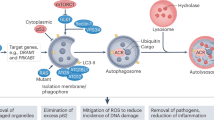Abstract
Tumour cells are derived from normal cells that undergo numerous genetic and epigenetic mutations under various stresses. This process involves changes in many intrinsic cellular mechanisms and in the microenvironment. Understanding the process is important for preventing tumorigenesis and tumour recurrence. Numerous studies have shown that sputum autophagy not only plays an important role in tumorigenesis but also has a dual role in tumour suppression and cancer promotion. On the one hand, excessive autophagy can cause apoptosis and death, thereby inducing an autophagic death mechanism that leads to the death of drug-resistant tumour cells in malignant tumours. On the other hand, autophagy can mediate tumour escape and promote the survival of tumour cells. With the expansion of in-depth research, increasing evidence has shown that the specific role of autophagy in tumorigenesis may be related to the specific stage of tumour development and specific tumour type.
Access this chapter
Tax calculation will be finalised at checkout
Purchases are for personal use only
Similar content being viewed by others
References
Baghdadi M, Yoneda A, Yamashina T et al (2013) TIM-4 glycoprotein-mediated degradation of dying tumor cells by autophagy leads to reduced antigen presentation and increased immune tolerance. Immunity 39(6):1070–1081
Chen R, Zou Y, Mao D, Sun D, Gao G, Shi J, Liu X, Zhu C, Yang M, Ye W, Hao Q, Li R, Yu L (2014) The general amino acid control pathway regulates mTOR and autophagy during serum/glutamine starvation. J Cell Biol 206(2):173–182
Degenhardt K, Mathew R, Beaudoin B et al (2006) Autophagy promotes tumor cell survival and restricts necrosis, inflammation, and tumorigenesis. Cancer Cell 10(1):51–64
Fridman WH, Zitvogel L, Sautès-Fridman C et al (2017) The immune contexture in cancer prognosis and treatment. Nat Rev Clin Oncol 14(12):717–734
Grivennikov SI, Wang K, Mucida D et al (2012) Adenoma-linked barrier defects and microbial products drive IL-23/IL-17-mediated tumour growth. Nature 491(7423):254–258
Jing Y, Sun K, Liu W et al (2018) Tumor necrosis factor-alpha promotes hepatocellular carcinogenesis through the activation of hepatic progenitor cells. Cancer Lett 434:22–32
Jing YY, Liu WT, Guo SW et al (2015) Hepatitis B virus (HBV) receptors: deficiency in tumor results in scant HBV infection and overexpression in peritumor leads to higher recurrence risk. Oncotarget 6(40):42952–42962
Keller CW, Loi M, Ewert S et al (2017) The autophagy machinery restrains iNKT cell activation through CD1D1 internalization. Autophagy 13(6):1025–1036
Lin HH, Chung Y, Cheng CT et al (2018) Autophagic reliance promotes metabolic reprogramming in oncogenic KRAS-driven tumorigenesis. Autophagy 14(9):1481–1498
Liu WT, Jing YY, Gao L et al (2019) Lipopolysaccharide induces the differentiation of hepatic progenitor cells into myofibroblasts constitutes the hepatocarcinogenesis-associated microenvironment. Cell Death Differ. https://doi.org/10.1038/s41418-019-0340-7
Marcel N, Sarin A (2016) Notch1 regulated autophagy controls survival and suppressor activity of activated murine T-regulatory cells. Elife 5:e14023
Mortensen M, Soilleux EJ, Djordjevic G, Tripp R, Lutteropp M, Sadighi-Akha E, Stranks AJ, Glanville J, Knight S, W. Jacobsen SE, Kranc KR, Simon AK (2011) The autophagy protein Atg7 is essential for hematopoietic stem cell maintenance. J Exp Med 208(3):455–467
Moscat J, Karin M, Diaz-Meco MT (2016) p62 in cancer: signaling adaptor beyond autophagy. Cell 167(3):606–609
Pan XR, Jing YY, Liu WT et al (2017) Lipopolysaccharide induces the differentiation of hepatic progenitor cells into myofibroblasts via activation of the hedgehog signaling pathway. Cell Cycle 16(14):1357–1365
Ruan GX, Kazlauskas A (2012) Axl is essential for VEGF-A-dependent activation of PI3K/Akt. EMBO J 31(7):1692–1703
Saitoh T, Fujita N, Jang MH et al (2008) Loss of the autophagy protein Atg16L1 enhances endotoxin-induced IL-1beta production. Nature 456(7219):264–268
Sousa CM, Biancur DE, Wang X et al (2016) Pancreatic stellate cells support tumour metabolism through autophagic alanine secretion. Nature 536(7617):479–483
Wang C, Liang CC, Bian ZC, Zhu Y, Guan JL (2013) FIP200 is required for maintenance and differentiation of postnatal neural stem cells. Nat Neurosci 16(5):532–542
Wei J, Long L, Yang K et al (2016) Autophagy enforces functional integrity of regulatory T cells by coupling environmental cues and metabolic homeostasis. Nat Immunol 17(3):277–285
Zhong Z, Sanchez-Lopez E, Karin M (2016) Autophagy, inflammation, and immunity: a troika governing cancer and its treatment. Cell 166(2):288–298
Author information
Authors and Affiliations
Corresponding author
Editor information
Editors and Affiliations
Rights and permissions
Copyright information
© 2020 Science Press and Springer Nature Singapore Pte Ltd.
About this chapter
Cite this chapter
Liu, W., Meng, Y., Zong, C., Zhang, S., Wei, L. (2020). Autophagy and Tumorigenesis. In: Le, W. (eds) Autophagy: Biology and Diseases. Advances in Experimental Medicine and Biology, vol 1207. Springer, Singapore. https://doi.org/10.1007/978-981-15-4272-5_20
Download citation
DOI: https://doi.org/10.1007/978-981-15-4272-5_20
Published:
Publisher Name: Springer, Singapore
Print ISBN: 978-981-15-4271-8
Online ISBN: 978-981-15-4272-5
eBook Packages: Biomedical and Life SciencesBiomedical and Life Sciences (R0)




